To Regain Trust, Pulitzers May Go on the Road
Homepage photo: Website of Pulitzer Prizes promotes Journal-isms Roundtable
Journal-isms Roundtable photos by Sharon Farmer/sfphotoworks
Originally published May 26, 2022
[btnsx id=”5768″]
Madison Hopkins of the Better Government Association and Cecilia Reyes of the Chicago Tribune won the Pulitzer Prize for local reporting. “The 61 people who died in these fires represent about a third of the 170 deaths in all the fires combined. The majority were Black.” (Credit: YouTube)
To Regain Trust, Pulitzers May Go on the Road
When the average American thinks of journalists, it’s not of the still-unpunished white cop who terrorized Black women in Kansas, and the columnist who kept the case before readers in 19 of her columns last year. That would be Melinda Henneberger (pictured, below, by Paul Kitagki, Sacramento Bee), then of the Kansas City Star, now of the Sacramento Bee.
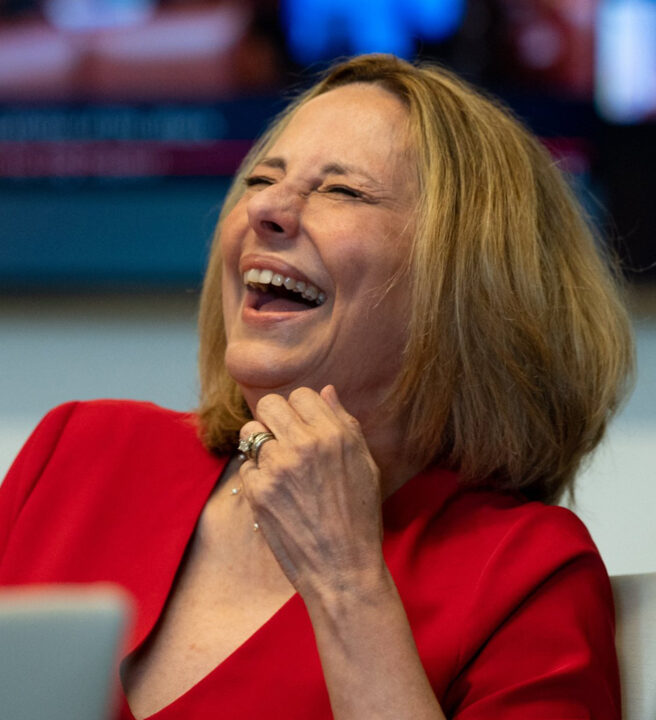 Or in Texas, where the editorial board of the Houston Chronicle used the tools of journalism to expose how government officials’ efforts to suppress the Black and brown vote through baseless claims of voter fraud have real-life consequences.
Or in Texas, where the editorial board of the Houston Chronicle used the tools of journalism to expose how government officials’ efforts to suppress the Black and brown vote through baseless claims of voter fraud have real-life consequences.
One woman lives in fear that she’s going to prison because she mistakenly cast a vote when she wasn’t eligible. “There are real victims to . . . this campaign of misinformation,” according to Luis Carrasco, who was a member of that board. The editorials noted that such tactics aren’t new. “You know, going back to post-Reconstruction. You had groups in Texas that wanted to ensure that Black and brown voters . . . didn’t go to the polls”.
All of these journalists won the Pulitzer Prize this month, and they and other winners gathered Sunday by Zoom at the Journal-isms Roundtable. Seventy people were on the Zoom, with another 172 watching on Facebook.
Pulitzer Prize winners and finalists gathered Sunday for the Journal-isms Roundtable. Seventy people were on the Zoom, with another 172 watching on Facebook. (Credit: YouTube)
“I thought yesterday’s was one of the most powerful roundtables, I have attended, which is saying something,” Fergus Shiel, managing editor of the International Consortium of Investigative Journalists, messaged on Monday.
“It was unexpectedly moving because all the stories revealed awful human rights abuses that had similar root causes, dysfunction, virulent racism and inequality.
“They shared a central nexus: failed regulation and impunity based on wealth and race causing horrific human suffering.
“I felt listening that I was ricocheting from avoidable tragedy to avoidable tragedy — embedded in willful laxity by various authorities.
“I loved one of the reporter’s description of their work as ‘blunt and airtight.’ It was a clarion call.
“And I thought it was revealing the way that each and every one spoke of the need for perseverance and time to unravel deep seated issues.
“The fact that the serial abuser, and probably murderous, Kansas policeman had yet to be prosecuted was the single most shocking fact.
“The way the NYT had mapped the violent road stops and cross referenced them with tax data was remarkably telling.”
What those in attendance witnessed might be a new chapter in the life of the Pulitzer Prizes, which were established in 1917.
“You know, I just took over this job a little more than a month ago, and I think that the Pulitzer brand and the Pulitzer winners can hopefully be much more active in a couple of areas,” Marjorie Miller, the Pulitzers’ new administrator, told us. Miller suggested that the Pulitzers “take this show on the road and get into places that are maybe open to hearing from us, and what we do and what you do.”
Such a move might demonstrate “why journalism is a key to democracy, and that’s one of the reasons that I was so happy to see so many local winners, because journalism is a key part of the democratic process, which is under threat everywhere, including the United States. . . . One thing that is really misunderstood across the country is, what is journalism?
“What is deeply reported journalism, and how is it done?
“And these are the people who are . . . doing some of the best work, but not all of the best work, in the country. . . .
“If we could find ways to get into communities, that either are news deserts or they’re very, very skeptical of journalists and journalism, and what we do, and viewed as the enemy or the Man or whatever, and try to break down some of those barriers.”
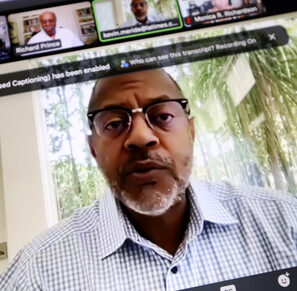 Kevin Merida (pictured), a Pulitzer board member as well as executive editor of the Los Angeles Times, called thinking in that direction an effort “to demystify the Pulitzer prizes, but also to use the board and the Pulitzers as a catalyst for inspiring other work. . . . It’s always a big moment, you know, to win a Pulitzer prize, or to be a finalist, . . . but we also know that that’s really just an emblem, because there’s so much work that’s being done that may not win a Pulitzer. . . .”
Kevin Merida (pictured), a Pulitzer board member as well as executive editor of the Los Angeles Times, called thinking in that direction an effort “to demystify the Pulitzer prizes, but also to use the board and the Pulitzers as a catalyst for inspiring other work. . . . It’s always a big moment, you know, to win a Pulitzer prize, or to be a finalist, . . . but we also know that that’s really just an emblem, because there’s so much work that’s being done that may not win a Pulitzer. . . .”
The prizes are “really just a catalyst to celebrate the work, call attention to it, to share best practices . . . and really make it more important in the public mind.”
Henneberger, for one, agreed. She messaged afterward, “What a great group, every one of whom I loved hearing from. And I agree that if people could hear from us what our work is really like, and why we do it, then maybe we could change a few more minds.”
The diversity among the winners did not escape notice. As Merida underscored in response to a question, the jury pools were, “I believe . . .the most diverse “that we’ve ever had. The board is always looking at at diversity, and in all the ways that that manifests itself.”
That diversity includes race, but is not limited to that. Merida pointed to the explanatory reporting prize, which went to Quanta Magazine for coverage that the board said “revealed the complexities of building the James Webb Space Telescope.” The prize in biography went to “Chasing Me to My Grave: An Artist’s Memoir of the Jim Crow South,” by the late Winfred Rembert as told to Erin I. Kelly.
Rembert “began making art at age 51, encouraged by his wife Patsy, by translating his experiences into colorful leather canvases filled with characters and scenes of black America that rarely make it into galleries,” according to the Chicago Review of Books. Rembert “wants you to know what drove him from picking cotton at age nine to being a local basketball star to surviving a lynching, working chain gangs, and gaining renown as a visual artist.”
Darryl Fears of The Washington Post, whose team was a finalist in the national reporting category, spoke of environmental racism aimed at Black, brown, and Native communities. “And what we found was a link to redlining and government planners targeting these areas to cite them.”
The Wall Street Journal was a finalist for its look back at the Tulsa massacre of “Black Wall Street” in 1921.
“It was a team of mostly Black journalists, Latino journalists and Asian journalists that came together on their own, and said that we wanted to do a big project on race and business and looking at the wealth gap and institutionalized racism,” said the Journal’s Kimberly Johnson. Cecilia Reyes of the Chicago Tribune after winning the Pulitzer Prize in Local Reporting with Madison Hopkins of the Better Government Association, not pictured. (Credit: Jose M. Osorio/Chicago Tribune)
Cecilia Reyes of the Chicago Tribune after winning the Pulitzer Prize in Local Reporting with Madison Hopkins of the Better Government Association, not pictured. (Credit: Jose M. Osorio/Chicago Tribune)
In the local reporting category, Madison Hopkins of the Better Government Association and Cecilia Reyes of the Chicago Tribune won for “a piercing examination of the city’s long history of failed building- and fire-safety code enforcement, which let scofflaw landlords commit serious violations that resulted in dozens of unnecessary deaths.”
Reyes told the Roundtable, Chicago’s “failed system of enforcement was with renters, primarily, people of color, especially Black residents.”
Perhaps most appreciated by fellow journalists was the look at how other shops make the sausage.
Kim Barker, part of a New York Times team that investigated fatal traffic stops, told the group, “We went into this project last year with a question, and it was a question from our editor, Dean Baquet, you know, and to be honest, rarely do good ideas come from editors.
“But he had the question after Daunte Wright was killed, like, ‘How come these traffic stops keep turning deadly?’”
Henneberger told the group, “You know my husband says ‘Melinda didn’t so much pursue this story as she was possessed by it,’ and that is the truth. I mean it was a very intensive emotional 24/7 kind of . . . there’s rarely a night when I didn’t have a late-night phone call from a victim just beside herself.”
The Miami Herald won in the breaking news category “For its urgent yet sweeping coverage of the collapse of the Champlain Towers South condominium complex, merging clear and compassionate writing with comprehensive news and accountability reporting.” The news organization put together this podcast. (Credit: YouTube)
Executive Editor Monica Richardson of the Miami Herald, whose staff won the Pulitzer for breaking news, said the newsroom’s coverage of the deadly condominium collapse “really came together from some pretty tremendous record gathering and dogged, really dogged approach to getting the information,” including hiring an engineer to evaluate the building’s construction.
She called the prize a testament to local journalism, a major theme of this year’s awards, and agreed with others who said such projects need not be undertaken only by large news organizations. They pointed to partnerships with national investigative reporting groups as well as with other news organizations.
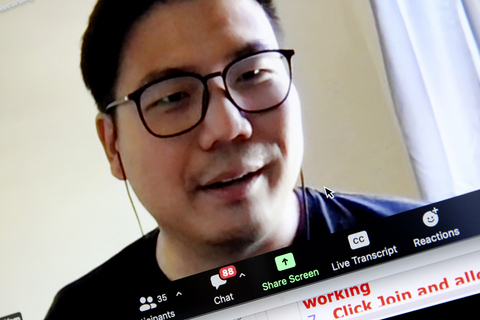 Marcus Yam (pictured), who won for breaking news photography for his work in Afghanistan, made one of the more telling observations. “One of the best kept secrets that I’ve had doing my job is I’ve got a good boss, really good boss and if . . . I had only one [piece of] advice [to] tell the young me, I’d say, find a good boss who’s willing to be your mentor, who is going to help you grow up, and you know, watch your back . . . It doesn’t matter if you’re working for a community newspaper or anywhere.
Marcus Yam (pictured), who won for breaking news photography for his work in Afghanistan, made one of the more telling observations. “One of the best kept secrets that I’ve had doing my job is I’ve got a good boss, really good boss and if . . . I had only one [piece of] advice [to] tell the young me, I’d say, find a good boss who’s willing to be your mentor, who is going to help you grow up, and you know, watch your back . . . It doesn’t matter if you’re working for a community newspaper or anywhere.
“You know you’ll grow . . . and you’ll do meaningful work that way.” His reference was to Calvin Hom, the L.A. Times’ director of photography. Yam related how Hom approved a trip to Afghanistan, despite budgetary limitations.
The Roundtable opened with summaries of the plans for the joint convention of the National Association of Black Journalists and National Association of Hispanic Journalists in Las Vegas Aug. 3-7, and a plea from Robin Blinder, editor of Editor & Publisher magazine, for ways to “cast a wider net” after a list of “editors extraordinaire” compiled from reader nominations, produced an all-white roster (scroll down).
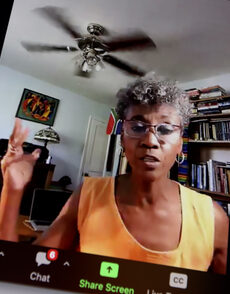 Dorothy Tucker (pictured) said, “Our plenary will be devoted to Ukraine. We’re going to look at the difference in coverage when it comes to race. Obviously, working with NAHJ and our partners there, we’ll take a look [at] how refugees are treated when they cross the border, vs. refugees that come from Ukraine. There’s lots of questions. We have been in touch with some reporters who actually have been reporting in Ukraine. They will be joining us and we’re really excited about that.
Dorothy Tucker (pictured) said, “Our plenary will be devoted to Ukraine. We’re going to look at the difference in coverage when it comes to race. Obviously, working with NAHJ and our partners there, we’ll take a look [at] how refugees are treated when they cross the border, vs. refugees that come from Ukraine. There’s lots of questions. We have been in touch with some reporters who actually have been reporting in Ukraine. They will be joining us and we’re really excited about that.
“The Buffalo shooting is now top of mind. It is something that definitely will be added to the agenda. I spoke with the programming chairs last week, and asked them to add another session. When it came to white supremacism, when it came to race and crime, but this is hate. . . . “
Tucker also said NABJ would offer more workshops on entrepreneurship and “many more investigative panels than we’ve probably ever seen before.”
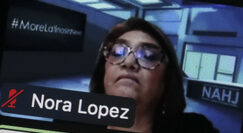 Nora Lopez, president of NAHJ, said that organization would also discuss the Buffalo mass shooting and Ukraine, and added, “we want to do an investigative and data journalism workshop in Spanish.” That will be open to all, she said.
Nora Lopez, president of NAHJ, said that organization would also discuss the Buffalo mass shooting and Ukraine, and added, “we want to do an investigative and data journalism workshop in Spanish.” That will be open to all, she said.
The two presidents were also asked about what some experts have called the denial by many people of the continuing COVID threat, especially with a new variant on the rise, and about warnings that being double “vaxxed and boosted” are not enough to forestall infections.
Tucker said, “I think it’s important to note that we are going to follow the CDC. Obviously, if Vegas shuts down, then what are you gonna do? We are going to make sure that we are in touch with the health experts as we go into the convention early on. . . . We do still think that it is important that those who attend the conference have that vaccine verification.
“We do think that it is important that we have a mask mandate. You know, we will have masks on site, so that if you forget yours . . . we’ll have one there for you. But at the end of the day, this is evolving, it’s changing, and we will just make sure that we will do the safest things possible. . . .”
Lopez said, “I think we are all going through a lot of COVID fatigue, we’ve been through this for two years now, and everybody needs to use their own personal common sense. We are doing what we can to abide by CDC rules. We’re not the doctors, we’re not the scientists, so we have to follow some guidelines, and we are following theirs. We’re going to have a mask requirement, asking that you be vaccinated, but I think beyond that, it’s up to every person individually.
“I know I’m going to be wearing a mask as much as possible because I have an elderly mother that I’m worried about, so I’m going to do what I need to do, and I think at some point, after two years, people need to develop some common sense about this.”
- Nellie Andreeva, Deadline: How Upfronts 2022 Became Covid Superspreader Event
- Madeline Buckley and Tracy Swartz, Chicago Tribune: Face coverings remain optional in newest COVID-19 spike, but doctors encourage people to put on masks again
- Norah O’Donnell, Twitter: I am still recovering from Covid, but my heart is in Texas
- Eric Topol, Ground Truths: The Covid Capitulation: As the virus accelerates its evolution, humans retrogress (May 15)
‘[btnsx id=”5768″]
To subscribe at no cost, please send an email to journal-isms+subscribe@groups.io and say who you are.
Facebook users: “Like” “Richard Prince’s Journal-isms” on Facebook.
Follow Richard Prince on Twitter @princeeditor
Richard Prince’s Journal-isms originates from Washington. It began in print before most of us knew what the internet was, and it would like to be referred to as a “column.” Any views expressed in the column are those of the person or organization quoted and not those of any other entity. Send tips, comments and concerns to Richard Prince at journal-isms+owner@
View previous columns (after Feb. 13, 2016).
View previous columns (before Feb. 13, 2016)
- Diversity’s Greatest Hits, 2018 (Jan. 4, 2019)
- Book Notes: Is Taking a Knee Really All That? (Dec. 20, 2018)
- Book Notes: Challenging ’45’ and Proudly Telling the Story (Dec. 18, 2018)
- Book Notes: Get Down With the Legends! (Dec. 11, 2018)
- Journalist Richard Prince w/Joe Madison (Sirius XM, April 18, 2018) (podcast)
- Richard Prince (journalist) (Wikipedia entry)
- February 2018 Podcast: Richard “Dick” Prince on the need for newsroom diversity (Gabriel Greschler, Student Press Law Center, Feb. 26, 2018)
- Diversity’s Greatest Hits, 2017 — Where Will They Take Us in the Year Ahead?
- Book Notes: Best Sellers, Uncovered Treasures, Overlooked History (Dec. 19, 2017)
- An advocate for diversity in the media is still pressing for representation, (Courtland Milloy, Washington Post, Nov. 28, 2017)
- Morgan Global Journalism Review: Journal-isms Journeys On (Aug. 31, 2017)
- Diversity’s Greatest Hits, 2016
- Book Notes: 16 Writers Dish About ‘Chelle,’ the First Lady
- Book Notes: From Coretta to Barack, and in Search of the Godfather
- Journal-isms’ Richard Prince Wants Your Ideas (FishbowlDC, Feb. 26, 2016)
- “JOURNAL-ISMS” IS LATEST TO BEAR BRUNT OF INDUSTRY’S ECONOMIC WOES (Feb. 19, 2016)
- Richard Prince with Charlayne Hunter-Gault, “PBS NewsHour,” “What stagnant diversity means for America’s newsrooms” (Dec. 15, 2015)
- Book Notes: Journalists Follow Their Passions
- Book Notes: Journalists Who Rocked Their World
- Book Notes: Hands Up! Read This!
- Book Notes: New Cosby Bio Looks Like a Best-Seller
- Journo-diversity advocate turns attention to Ezra Klein project (Erik Wemple, Washington Post, March 5, 2014)
When you shop @AmazonSmile, Amazon will make a donation to Journal-Isms Inc. https://t.co/OFkE3Gu0eK
— Richard Prince (@princeeditor) March 16, 2018
![]()

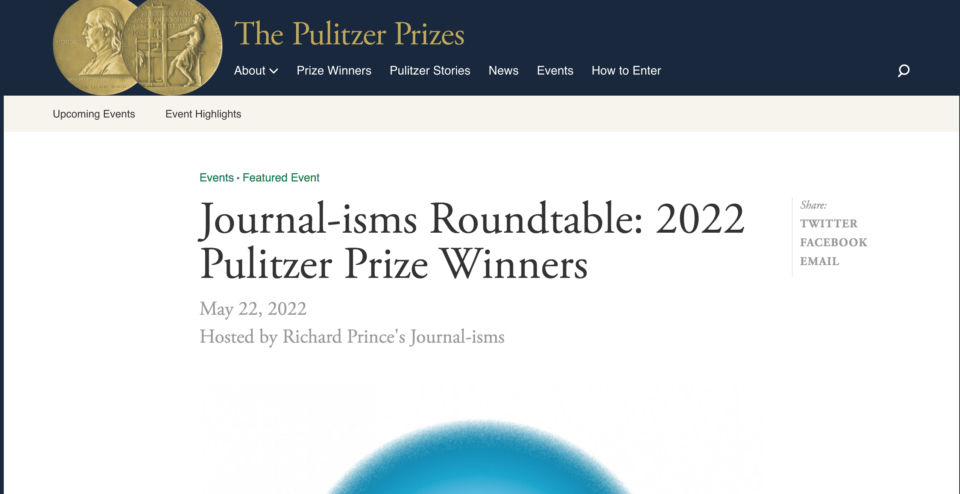
2 comments